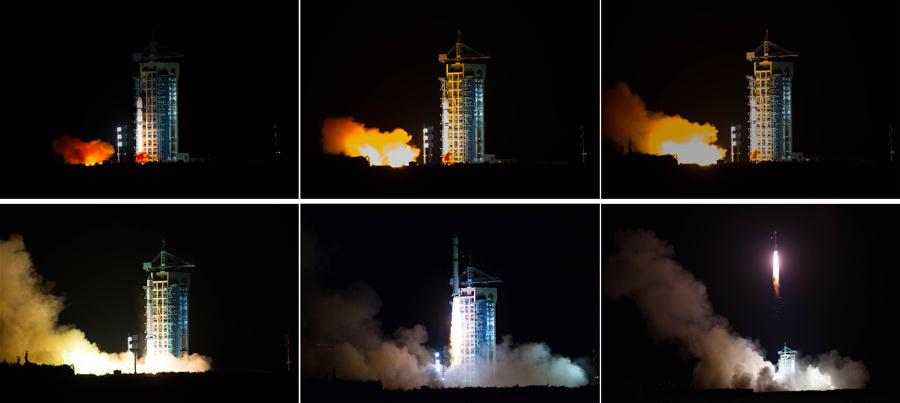


Combined photo shows China launching the world's first quantum satellite on top of a Long March-2D rocket from the Jiuquan Satellite Launch Center in Jiuquan, northwest China's Gansu Province, Aug. 16, 2016. The world's first quantum communication satellite, which China has launched, has been given the moniker "Micius," after a fifth century B.C. Chinese scientist, the Chinese Academy of Sciences (CAS) announced Monday. (Xinhua/Jin Liwang)
WASHINGTON, Aug. 15 -- China's successful launch of the world's first quantum satellite was "very exciting" and can help conduct experiments that may lead to "much more secure" quantum communications, a U.S. quantum expert said.
"The event is indeed very exciting and does carry global importance because this would be the first such experiment," said Alexander Sergienko, a professor of electrical and computer engineering at the Boston University.
The satellite, Quantum Experiments at Space Scale (QUESS), lifted off from China's Jiuquan Satellite Launch Center at 1:40 a.m. Tuesday, local time.
Sergienko said the quantum communication race has been going on for the last 20 years since the initial demonstration of quantum key distribution link under Lake Geneva in 1995.
After that, metropolitan secure communication networks have been developed and demonstrated in Boston, Vienna, Beijing, and Tokyo, and many more examples of quantum metropolitan networks have been demonstrated in the last five years covering Canada, Italy, U.K. and Australia, he said.
"The race is now moving in the near space in order to cover longer distances between different metropolitan areas," he said.
"I know there were plans to develop multiple point-by-point multi-city quantum communication segments to cover the distance between Shanghai and Beijing. A successful implementation of the satellite project would allow covering it in one step."
Sergienko also predicted that quantum communication and cryptography will be first used to ensure the most important communication lines such as used by the government and by major business in their communication.
China said the 600-plus-kilogram QUESS, nicknamed "Micius," is expected to circle the Earth once every 90 minutes after it enters a sun-synchronous orbit at an altitude of 500 kilometers.
In its two-year mission, QUESS is designed to establish "hack-proof" quantum communications by transmitting uncrackable keys from space to the ground, and provide insights into the strangest phenomenon in quantum physics -- quantum entanglement.
Day|Week

 Who Will Fit The Chinese Roles In Game Of Thrones?
Who Will Fit The Chinese Roles In Game Of Thrones? China's Hubei Shennongjia added to World Heritage List
China's Hubei Shennongjia added to World Heritage List Cute Dog At Fruit Stand Becomes Latest Internet Sensation
Cute Dog At Fruit Stand Becomes Latest Internet Sensation Thai most beautiful transgender Nong Poy release new photos
Thai most beautiful transgender Nong Poy release new photos Top 10 livable Chinese cities
Top 10 livable Chinese cities The last primitive tribe in China
The last primitive tribe in China China's first intelligent security robot debuts in Chongqing
China's first intelligent security robot debuts in Chongqing A Total of 3,552 Subscribers Vanish In Two Days; YouTube Closes All Doors to Users’ Inquiries
A Total of 3,552 Subscribers Vanish In Two Days; YouTube Closes All Doors to Users’ Inquiries Out of this world! Futuristic UFO-shaped yacht has its own garden and a stunning underwater viewing deck
Out of this world! Futuristic UFO-shaped yacht has its own garden and a stunning underwater viewing deck An old tea house in Chengdu
An old tea house in Chengdu